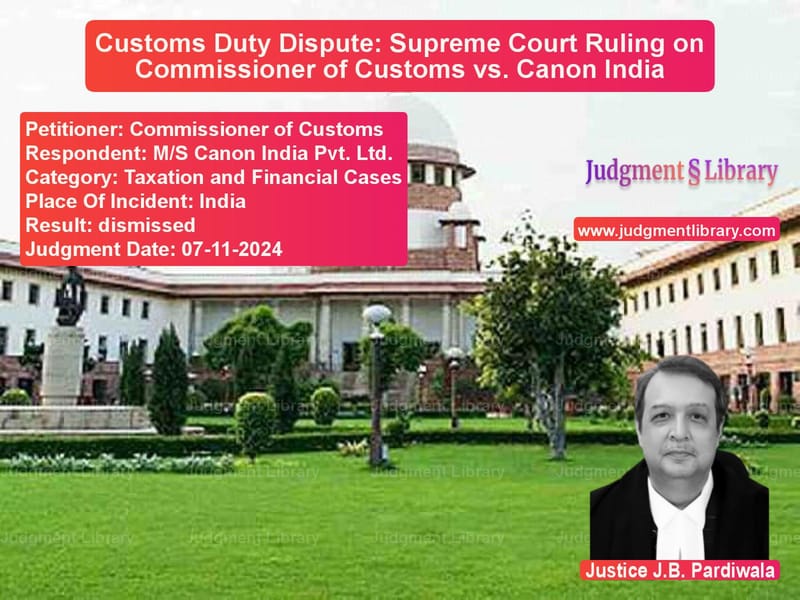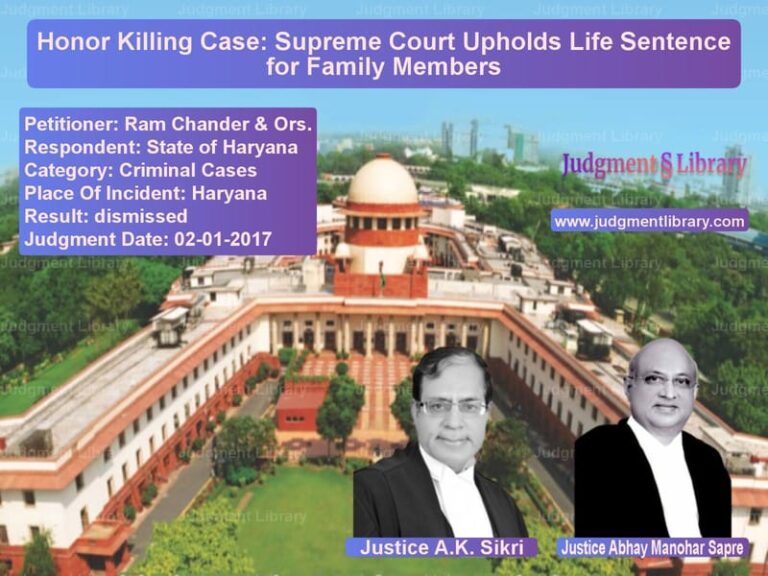Customs Duty Dispute: Supreme Court Ruling on Commissioner of Customs vs. Canon India
The Supreme Court recently delivered a landmark judgment in the case of Commissioner of Customs vs. M/S Canon India Pvt. Ltd., addressing crucial issues related to the jurisdiction of customs officers in assessing and reviewing import duty cases. The ruling focuses on whether the Directorate of Revenue Intelligence (DRI) officers can act as proper officers under Section 28 of the Customs Act, 1962, and how amendments in the Finance Act, 2022, impact pending cases.
This case stems from a long-standing dispute over whether DRI officers have the authority to issue show-cause notices regarding customs duties. The Supreme Court revisited its earlier rulings, including the case of Commissioner of Customs v. Sayed Ali and Mangali Impex vs. Union of India, to determine the constitutional validity of DRI officers exercising assessment powers.
Background of the Case
The dispute began when Canon India imported digital cameras and related equipment. The Commissioner of Customs assessed the duty at a particular rate. However, the Directorate of Revenue Intelligence (DRI) later issued a show-cause notice, alleging that the company had misdeclared certain items to evade customs duty.
Canon India challenged the notice, arguing that the DRI officers did not have the authority to reassess duties that had already been determined by a jurisdictional customs officer. The company relied on the Supreme Court’s ruling in Sayed Ali, which held that only officers assigned specific functions under the Customs Act could issue show-cause notices.
Initially, the Customs Department argued that the Finance Act, 2022, retrospectively validated all past DRI actions, making their notices legally binding. The matter reached the Supreme Court as Canon India sought a declaration that the notices were invalid and unenforceable.
Arguments by the Petitioner (Commissioner of Customs)
- The Customs Department contended that amendments to the Customs Act allowed DRI officers to act as “proper officers” for assessing and re-assessing import duties.
- They argued that Section 28 of the Act empowered all officers to review past duty assessments and issue show-cause notices.
- The retrospective amendments in the Finance Act, 2022, were intended to override the Supreme Court’s earlier ruling in Sayed Ali.
- The Customs Department insisted that allowing importers to challenge DRI notices would create widespread uncertainty in customs assessments and encourage tax evasion.
Arguments by the Respondent (Canon India)
- Canon India argued that the retrospective validation of DRI notices violated principles of legal certainty and fair procedure.
- The company stated that its customs duty assessment was finalized by a jurisdictional officer, and the DRI could not reassess it without express authorization.
- The respondent relied on the Supreme Court’s earlier judgment in Mangali Impex, which held that only officers assigned assessment functions under Section 2(34) of the Customs Act could issue reassessment notices.
- They contended that allowing retrospective amendments to validate DRI actions would open the floodgates for arbitrary enforcement and retrospective taxation.
Supreme Court’s Analysis
The Supreme Court examined the validity of retrospective amendments in the Finance Act, 2022, and whether they could override previous judicial pronouncements.
1. Interpretation of “Proper Officer” under the Customs Act
The Court reiterated that Section 2(34) of the Customs Act defines a “proper officer” as one assigned specific duties by the Board or the Principal Commissioner. It observed:
“The retrospective amendment seeks to assign unlimited powers to DRI officers, which goes against the scheme of the Customs Act. An assessment by a jurisdictional officer cannot be reopened arbitrarily.”
2. Retrospective Validation of DRI Notices
The Court ruled that while Parliament has the power to amend laws retrospectively, such amendments cannot nullify judicial rulings. It stated:
“Legislation cannot be used as a tool to defeat constitutional principles. The Finance Act, 2022, cannot override settled legal doctrines regarding reassessment jurisdiction.”
3. Effect on Pending Cases
The judgment clarified that any reassessment action taken by DRI officers before the 2022 amendment was invalid. It directed customs authorities to follow proper assessment procedures under the Customs Act and not rely on retrospective laws for enforcement.
Final Judgment
- The Supreme Court ruled that the show-cause notices issued by DRI officers before the 2022 amendment were invalid.
- It held that only jurisdictional customs officers could assess and reassess import duties.
- The retrospective amendments in the Finance Act, 2022, could not be applied to override Supreme Court judgments.
- The appeal filed by the Customs Department was dismissed.
Implications of the Judgment
- Restriction on DRI Powers: DRI officers can no longer unilaterally reassess customs duties unless explicitly authorized.
- Protection Against Retrospective Taxation: The ruling ensures that importers are not subjected to arbitrary reassessments based on later amendments.
- Judicial Precedent Strengthened: The Supreme Court reaffirmed that legislative amendments cannot be used to overturn judicial decisions.
- Impact on Pending Cases: Importers who received reassessment notices from DRI before 2022 can challenge their validity.
The ruling serves as a significant precedent in customs law, ensuring fair enforcement of tax laws without arbitrary reassessments by revenue authorities.
Petitioner Name: Commissioner of Customs.Respondent Name: M/S Canon India Pvt. Ltd..Judgment By: Justice J.B. Pardiwala.Place Of Incident: India.Judgment Date: 07-11-2024.
Don’t miss out on the full details! Download the complete judgment in PDF format below and gain valuable insights instantly!
Download Judgment: commissioner-of-cust-vs-ms-canon-india-pvt.-supreme-court-of-india-judgment-dated-07-11-2024.pdf
Directly Download Judgment: Directly download this Judgment
See all petitions in Income Tax Disputes
See all petitions in GST Law
See all petitions in Tax Evasion Cases
See all petitions in Customs and Excise
See all petitions in Banking Regulations
See all petitions in Judgment by J.B. Pardiwala
See all petitions in dismissed
See all petitions in supreme court of India judgments November 2024
See all petitions in 2024 judgments
See all posts in Taxation and Financial Cases Category
See all allowed petitions in Taxation and Financial Cases Category
See all Dismissed petitions in Taxation and Financial Cases Category
See all partially allowed petitions in Taxation and Financial Cases Category







